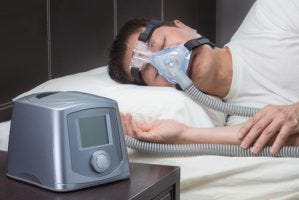USPSTF does not advise screening for obstructive sleep apnea

After an extensive review, the U.S. Preventive Services Task Force (USPSTF) concluded that there is insufficient evidence to recommend for or against screening adults for obstructive sleep apnea (OSA). In a statement posted to the website of the Journal of the American Medical Association the USPSTF panel said that in adults who are not actively complaining of symptoms of obstructive sleep apnea (mainly, excessive daytime sleepiness), it was "unable to determine the magnitude of the benefit or harms of screening for OSA or whether there is a net benefit or harm to screening." The USPSTF's conclusion was mostly a result of the relatively weak body of research regarding OSA screening. USPSTF's literature review could find no studies that directly evaluated the effect of screening for OSA on meaningful health outcomes like death, quality of life, heart attacks or strokes. Screening tools (like sleep questionnaires) for predicting benefit of treatment also had a weak evidence base. Although they concluded screening cannot be recommend to the population at large, "The data suggest that the main benefit for treating sleep apnea (in asymptomatic patients) is reducing daytime sleepiness," a USPSTF member told the press.
USPSTF and Sleepy Societies Disagree
The panel's recommendation is in conflict with the American Academy of Sleep Medicine (AASM), who recommend OSA screening by asking all adult patients about symptoms of OSA and screening those without symptoms, if they have risk factors. A past AASM president went on record against the USPSTF panel's recommendations, endorsing screening of adult patients in primary care clinics. OSA is believed to be underdiagnosed and undertreated, with as many as 22 million Americans affected. Screening the U.S. population would result in millions more people with OSA being discovered, and prescribed treatment. Wouldn't this be a good thing? For some of those people, absolutely. But population screening decisions are more complicated than that.
Health Risks of Milder Sleep Apnea Still Unknown
Although severe sleep apnea is associated with an increased risk for significant health problems (death, cardiovascular disease, diabetes, cognitive impairment, motor vehicle accidents, etc.), the degree to which OSA causes any of these outcomes (rather than just being present along with them) is not known. Milder OSA -- which is far more common -- appears to have significantly lower health risks than does severe obstructive sleep apnea. Endorsing the pursuit of the diagnosis of mild OSA in these millions of people (many of whom have few or no symptoms) would result in a parade of container ships hitting U.S. shores laden with CPAP machines destined to languish in closets and landfills. The USPSTF didn't say this, but they were probably thinking it. An editorialist, Dr Susan Redline at Harvard, cautioned that the USPSTF recommendations, if misinterpreted, "could negatively influence public health if they are used to discourage direct questioning or deployment of short screening questionnaires for identifying patients at high risk for OSA." "Encouraging patient and clinician discussion of relevant symptoms and signs of OSA is one way to help address early recognition," she wrote. "Although increasing the likelihood of early recognition is not without its challenges, primary care clinicians have an important role in mitigating the adverse health consequences of OSA that can ensue from years of unrecognized disease." Pregnant women were excepted from the pronouncement.

Clinical Takeaway: Screening all adults for obstructive sleep apnea will certainly detect people who will benefit from treatment with CPAP. It will also detect many times more people who will not. Unlike screening for cancer or cardiovascular disease, in which the evidence at least provides accepted guesses for numbers needed to treat to benefit from screening, the benefits of population screening for OSA relative to its costs remain unknown. People with daytime sleepiness and risk factors for OSA should be offered sleep testing. Read more:
Screening for Obstructive Sleep Apnea in Adults. US Preventive Services Task Force Recommendation Statement. JAMA. 2017;317(4):407-414


